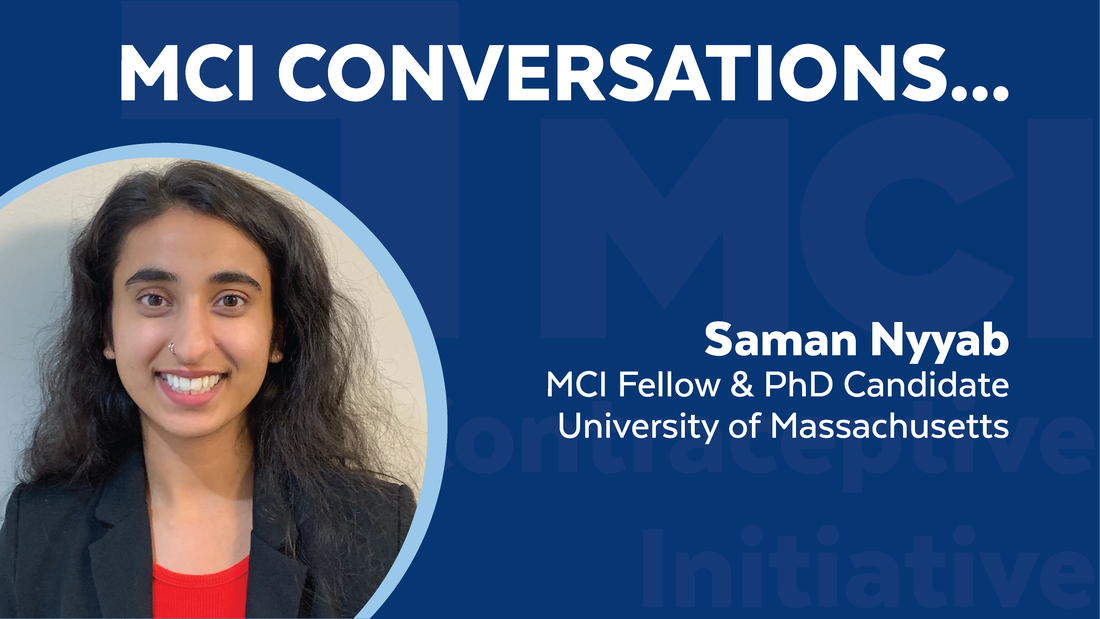|
Saman Nayyab is a PhD student at the University of Massachusetts Amherst in Dr. Pablo Visconti's Lab. She is interested in the field of reproduction--regardless if it is studying the male aspect or the female aspect--and believes there is much to uncover in this field. In this blog post, Saman shares about her work in the field of contraception, what she hopes to learn as an MCI fellow, and the future outlook of male contraception. What have you focused your studies on? How does that relate to male birth control? I have focused on studying the role of testis specific serine kinases (TSSKs) during sperm development and fertilization. These kinases consist of six families: TSSK1-6 and are conserved across species (mouse, humans, yeast, etc.). However, not much is known about these kinases regarding their specific role in testes and sperm. Our preliminary data suggest that TSSK1 and TSSK2 (individually) knockout male mice are unable to fertilize wild-type female mice, though they successfully mate. On the other hand, TSSK1 and TSSK2 knockout female mice have no problem in producing pups from wild-type males. Therefore, these kinases can be a good target for male contraception due to the fact that they are testis specific, meaning that they are present solely in testes, and our preliminary data suggest that these kinases affect fertilization. Why were you excited to work with MCI? What do you see that you bring to MCI? I am excited to work with MCI because I feel there is so much new science to discover regarding male contraception that can really help change society for the good. I am also very excited to work with MCI because everyone is super friendly, helpful, and smart. With the help of MCI, I see myself providing new information about male reproduction that could bring us one step closer to novel male contraception. What skills would you like to learn or develop while with MCI? With the help of MCI, I hope to learn many advanced research techniques, including mass spectrometry, transmission electron microscopy, and nuclear magnetic resonance. I strongly believe that these techniques will mold me into a better scientist and open multiple career doors for me after graduation. Additionally, I would also like to collaborate with other scientists to combine ideas and learn from one another. This will provide me with great resources in the field of reproduction and again, help my future post graduation. What is your connection to, or interest in, contraception? When I joined Geyer lab as a master’s student in 2016, I was amazed with how little is known about the differentiation process in male germ cells and the impact this lack of knowledge has on the society. As of today, male contraceptives are still limited to condoms and vasectomy, both of which are far from being optimal. Therefore, family planning continues to primarily be the responsibility of women even though a large number of men would welcome the opportunity to use male contraceptive methods. Being able to assist in the developing a solution to this problem is one of the reasons this research is important to me What do you think are the biggest challenges affecting contraception, generally, and male contraception, specifically? Generally, I think the biggest challenge affecting contraception is getting the public to understand its importance on society. Specific to male contraception, I think the biggest challenge is the unknown science regarding male reproduction that can only be overcome by research. Because there are a plethora of options for female-based contraception, I feel that male contribution to reproduction is ignored. Do you think these challenges and opportunities have evolved over time? If so, how? I believe the new generation is a lot more open-minded and accepting of contraception (even male contraception). Moreover, with new and advanced techniques in science, we know so much more about reproduction and male reproduction that can all help us lead to new methods of contraception. Last year when I attended my very first Fertilization and Activation of Development Gordon Conference, I was really impressed with all the research currently happening all over the world with regards to contraception. What are your hopes for the near and far future of male contraception? What will it take for these to become reality? My hopes for male contraception is that it becomes a common routine among people. With it, everyone will have more control over their lives, which will ultimately be better for society all over the world. This can only be accomplished with research and education. We are incredibly excited about Saman’s work. We also look forward to connecting her with other scientists in the research community so that the innovative exploration into male reproduction continues to have widespread growth. Interested in learning more about Saman? You can listen to her speak about the exciting research she is facilitating at the Visconti lab here.
Comments are closed.
|
Categories
All
Archives
June 2024
|
|
|
Donate to Male Contraceptive InitiativeYour generous donation makes a difference!
|
© Male Contraceptive Initiative. All rights reserved.


 RSS Feed
RSS Feed
